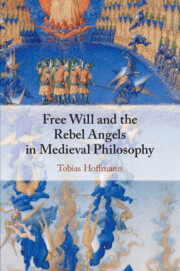Book contents
- Free Will and the Rebel Angels in Medieval Philosophy
- Free Will and the Rebel Angels in Medieval Philosophy
- Copyright page
- Dedication
- Contents
- Acknowledgments
- Abbreviations
- Citation Method
- Introduction
- Part I Free Will
- Part II Whence Evil?
- Chapter 6 Does Evil Have a Cause?
- Chapter 7 The Will as the Cause of Evil
- Part III Angelic Sin
- Bibliography
- Index of Manuscripts
- Index
Chapter 7 - The Will as the Cause of Evil
from Part II - Whence Evil?
Published online by Cambridge University Press: 26 November 2020
- Free Will and the Rebel Angels in Medieval Philosophy
- Free Will and the Rebel Angels in Medieval Philosophy
- Copyright page
- Dedication
- Contents
- Acknowledgments
- Abbreviations
- Citation Method
- Introduction
- Part I Free Will
- Part II Whence Evil?
- Chapter 6 Does Evil Have a Cause?
- Chapter 7 The Will as the Cause of Evil
- Part III Angelic Sin
- Bibliography
- Index of Manuscripts
- Index
Summary
Chapter 7 examines medieval theories of the first cause of evil. Although Augustine denied that something good is the cause of evil, medieval thinkers routinely attributed to him the view that something good – the will understood as a power of the soul – causes something evil. The majority of the thinkers considered in this chapter use Aristotle’s notion of accidental causality to argue that the will can cause evil not per se – that is, not intending evil as evil – but incidentally. Nevertheless, if the will causes evil, they face the dilemma that a good will cannot cause evil at all, and an evil will cannot cause the first evil will. Medieval thinkers deal with this dilemma in different ways. For example, Bonaventure and others hold that the created will is naturally defectible, and hence not entirely unflawed, and so it can do evil. Aquinas argues that the will causing evil for the first time presupposes a momentary nonculpable deficiency, which becomes culpable at the moment of the evil choice. For Scotus, the will is so free that it can do evil even if it is unflawed. Although all these views trace evil to the will as its cause, they hold that evil is ultimately unexplainable.
Keywords
- Type
- Chapter
- Information
- Free Will and the Rebel Angels in Medieval Philosophy , pp. 174 - 196Publisher: Cambridge University PressPrint publication year: 2020



